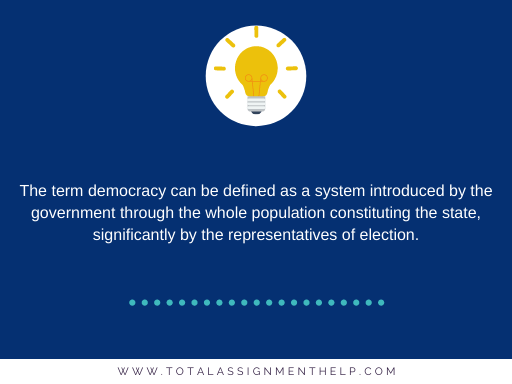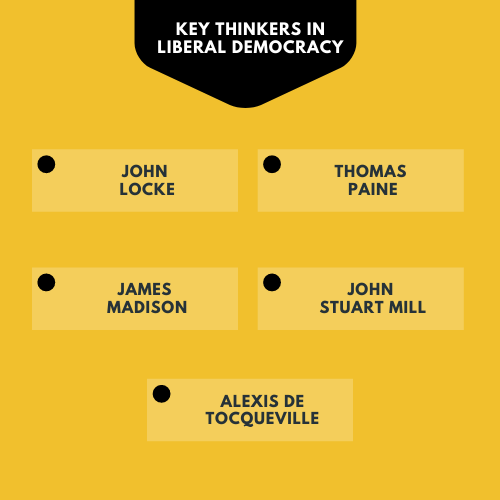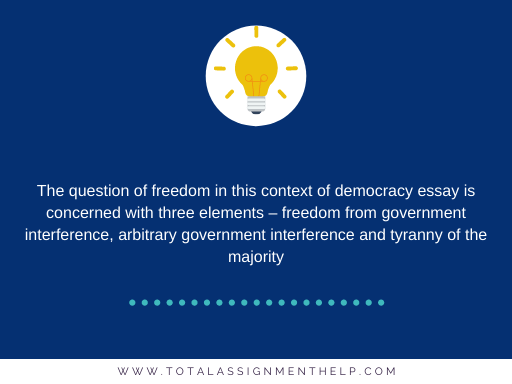Democracy Essay On The Freedom In Modern Societies
Question
Task: Write a democracy essay focusing on the form of democracy a modern society needs to adapt in order to understand the real concept of freedom.
Answer
Introduction
The term democracy focused in the sections of democracy essay can be defined as a system introduced by the government through the whole population constituting the state, significantly by the representatives of election. It is a concept which is essentially contested, thus it’s impossible to deduce its proper definition. The theory of “normative democracy” emphasizes on the actual meaning of the term. On the other hand, political freedom is defined as release from coercion and oppression and enabling “conditions of compulsion” in a social structure. It is closely engaged with the “human rights” and “civil liberties” which are shaped by the State’s protection on legal terms in a democratic atmosphere.

The democracy essay focuses on the form of democracy a modern society needs to adapt in order to understand the real concept of freedom. The main objectives linked with the particular topic explored in the democracy essay can be discussed as follows. Firstly, the theories of democracy are to be discussed. Secondly, the concept of freedom in modern societies is to be analyzed (Axtmann, 2019). Thirdly, a relationship between democratic foundations and the concept of freedom is to be viewed. Lastly, a conclusive deduction is to be made.
Background
The last three years of the “American Political Science Review” has focused on several attempts for reconstituting the theory of democracy in a classical way. The main element of the traditional theory is an informed and active democratic citizenry. But scholars belonging to the contemporary world have rejected the idea of democracy based on the classical theory. The main concern for them is the question on the acceptability of the “elitist theory” of democratic foundations comprising a series of norms that are political and acts as guidance for empirical way of research. It has got two sets of limitations (Brunkhorst, 2017). Firstly, the significance of democracy in a normative way has changed fundamentally in the hunt for realism, and rendered a more traditionalist doctrine. Secondly, it is noted in the context of this democracy essay that the social acceptance of the elitist theory did not look into several vital factors related to development in the social structure.
Implications of the elitist theory include the reliability of democratic systems on the political leader’s skills, wisdom, and loyalties, but do not focuses upon the population at holistic terms. The factor distinguishing authoritarian and democratic systems is supplying for peaceful and limited competition among the elite members for the leadership positioning in the system. Thus democracy can be said to be the system by which decisions are made ensuring efficacy in policy making and administrations needing popular responsiveness of opinion. According to the Elitist theories considered in this segment of democracy essay, the factors considered as “potential threats to democracy” is the major wall for moving against the breakdown for constitutionalism (Campbell, 2019). Many elitist theorists argued that democracy has reasons for fearing the hike in the participation in the politics. The elitist theory concerns with the functioning needs of the system with a less thinking approach for human development in a holistic way.
Normative foundations of democracy cover the values underlying for justification of the principles of politics. Or in other words, they are the reasons underlying about the questions on why and what about does it actually matters. The relation between the normative and positive statements, in the context of system in UK is as follows. Firstly, the UK possesses a democracy of parliamentary system (Casassas & De Wispelaere, 2016). The “Swiss political system” is enabled for directing democratic behaviors than that of the UK’s. Democracies do not engage themselves with each other in a war (Cheneval, Lavenex, & Schimmelfennig, 2017). These are the positive statements. Secondly, the UK is more or less democratic itself. The Swiss political system is more than the UK’s democracy. Democratic conditions are good as it acts as prevention for wars. It is stated herein democracy essay that these are normative statements. According to the democratic foundations, the major values upon which democracy is based are equality in all members, and freedom defined as no natural right for ruling over someone else. Moreover, it has got pluralism, autonomy and legitimacy.
Various conceptions regarding democracy includes emphasizing several combinations of value, deducing different principles and interpretations, and practical implications of those derived principles. As to cite an example related to the case scenario of democracy essay, liberal democracy is focused upon freedom, although arguments said that considering freedom denotes democracy in a direct way or in a representative way. They justify on the basis of implementation of values, the factors concerning the following. Firstly, why democratic foundations are important is a question to be asked. Secondly, arguments are deduced about the form it must take (Chwaszcza, 2017). Thirdly, the role of the people of the societies having a democratic foundation is stipulated. As to cite an example, some consider the concept of democratic citizenry through voting in a regular basis, while others realize for having a duty to participate in the political structure in an active way.
Liberalism and democracy are linked in regard to the concept of realization of freedom in modern societies. Liberalism is a vast series of theories concerning inhibition on the state activities and individual liberty. As an individual possesses rights that are inalienable, a governing body must be legitimate (Honohan, 2018). They must receive the permission of the people who are governed. Constitutions must manifest democracy and liberal rights together. The key thinkers in liberal democracy are John Locke, Thomas Paine, James Madison, John Stuart Mill, and Alexis de Tocqueville.

According to Locke (Sullivan, 2019), it is noted herein democracy essay that everyone possesses natural rights regarding their property, liberty and life. He argued that government must form on the basis of accountability of protecting the rights and must be driven by considering consent. Although it did not imply the franchises that are universal, but it addressed the blind following of the public opinion by the common people.
The democracy essay examines the words of Paine (Best, 2019) that the conditions for security and freedom are to be emphasized in this regard. He stated that the existence of government concerns ensuring the security and freedom of the society, but is often threatened to both. Therefore, a government supporting democracy is required to resist deprivation of liberty among people. The minimal government is to be assured where it protects citizenry from much interference.
Madison (Dahl, 2017) stated that in the majoritarian democratic foundation,. Majority subordinates the rights of minority. He argued that to provide safeguarding to freedom, no one can get rid of interest, but the requirement of protection to minorities through constitutionalism helps to keep the group in check. Also, he said that dispersion of constitutional power imply that particular interests cannot overpower government.
According to Mill (Varouxakis, 2017), it is illustrated in this section of democracy essay that defense about tolerance and individuality acts as liberties the individuals should be protected from the despotism of the majority. Citizenry grow through assignation in a civic area, and from being faced with the different perspectives held by others.
Tocqueville (De Tocqueville, 2020) said that in the modern age, the spirit of equality is being followed by the democracy. Although the interest of self of the majorities may threat the freedom until the citizenry is participating in the associations that are shared.
Three forms of “tyranny of the majority” can be discussed within this democracy essay as follows. Firstly, majoritarian interest or the public minded people may not recognize how they have an impact on the interests of minorities (Natter, 2018). Secondly, majoritarian passion or the popular outrage or enthusiasm leads the voters. Thirdly, majoritarian righteousness or the imposing of ethical views by the majority led to bad results for various minorities. Modern democracy is built on liberalism and natural freedom demands the government to involve consent and not an arbitrary ruling. When the government considers all interests of the citizenry, the individual rights can be respected. Democracy is all about living in a society of politics and also remaining free as much as possible. Constitutions are meant to provide protection to the oppression of rulers and majorities on the citizen and minority rights respectively.
Many scholars have pointed out that there is no valid connection between democratic rule and individual liberty. Also, they argued that liberalism can be defined as a doctrine about what the law is ought to be while democracy is a doctrine about the determination of manner of what is going to be the law.
In this context of democracy essay, the civic republicanism is to be mentioned. The tradition concerning the civic republicanism possesses a different solution for the problem of self-interest. Despite of the protections offered by the institutions, republicans tend to appeal the character of the citizenry, their orientation towards the common goods, and their virtues with a civic base (Overeem, 2018). Aristotle (Winthrop, 2018) stated that if the people are sought to reshape their interests in a democratic setting, it will result into a disorganized society with no shared understandings regarding the common goods. Machiavelli (McCormick, 2019) stated in regards to the context of democracy essay that to maintain a republic in healthy terms, citizenry cooperating in projects that are shared is needed. They resist the tendency for corruption and it can be attained through religion. Rousseau (Sullivan, 2019) stated that as in the natural state, people are free for retaining within a political society. If the citizenry tends to govern themselves, their general will must rule over their wills in particular, requiring participation on an active note. It is clear that self-determination in an active way, counters the domination in a holistic way.
The question of freedom in this context of democracy essay is concerned with three elements – freedom from government interference, arbitrary government interference and tyranny of the majority (Pettit, 2017). While on the other hand it is also clear on this democracy essay that democracy focuses upon the minimalist governmental approach, electoral democratic foundation based on the enforcement of accountability, and “contestatory democracy” where minorities are capable of drawing attention over their interests. In this regard, the relationship shared between the democracy and rationality is to be discussed. Democratic theories must be based on social and rational choices, thus there is a shift from the society to the decision-making ability of an individual. Rational theory of choice is followed through the concepts of individual self-interest based on the economic theory of Adam Smith. It analyses the decision-making of an individual on the basis of an approach that is optimistic as individuals tend to seek maximization of their utility (Pickering, Bäckstrand, & Schlosberg, 2020). If it is possible for measuring the utility of an individual and the decisions can be analyzed based on that utility, the best public outcomes can also be measured. This is applied to the decisions concerning economy and politics. The social choice theory explored in the democracy essay is determined under the light of the theories attempting to understand individual choices leading to social or collective outcomes.

Another theory of the Condorcet Jury Theorem (Galeazzi, Rendsvig, & Slavkovik, 2019) states that if each individual has an independent and equal chance worse than perfect, for making a judgment on a question concerning faction, then the chance of correct majority judgment is approached as the size of the group increases. The preferences of the majority can be irrational although there is a rational approach regarding the preferences of the individuals. According to Arrow, there can be no process aggregating the preferences of a rational individual into the best “social choice” for the collective. According to many scholars, people are rational maximizers of utility and everyone cares about their own interest (Snir & Eylon, 2017). Along with the resources that are limited, citizenry has best interest to support their “special groups” by not being involved or informed themselves (Moore, 2018).
Accounting the performance democracy, as proposed by “Joseph Schumpeter” (Ober, 2017), voters judge their governments on the basis of their performance and how well the governments serve their individual interests and well-being. It gives rise to elitist democracy. It implies that the vision of democracy does not concern short term shared common good, but individual self-interest in making decisions and policies. Politics is to be considered herein this democracy essay as a marketplace where products are offered to political consumers in exchange of voting in the form of democracy (Lovett, 2016). It takes a very distinguishing view from that of the normative theories on democracy. In such models of economy as a marketplace that is competitive, there exist no normative actors. The democratic alternative suggested by Schumpeter is an appeal of the political leaders to the opinion initiated by the public through their offering of policies in a competitive way. Then only the citizenry will play a democratic role for voting (White, 2016). Democracy must be considered as an identified method through which a competitive struggle is conducted. This initiates the realization of freedom in terms of individual freedom for competing into leadership.
Conclusion
To conclude the above democracy essay I think it is to be clarified how the charge of domination is distinctive from other criticisms and a note of optimistic lesson is to be drawn. Since the concept of the Republicanism, the lines of criticism that are dominant have been analytical or practical. The practical line charged republican freedom as a distinguished concept and the submission is restricted with no validity of practicality. My analysis of the theory thereby depicts the vitality of the concepts on what is meant to be free, although it lacks a direct way of application into the fields of politics. I think that the arguments put forward by the critics involves the idea that republicanism is not yielded for determining implications of policy, arrangements of knowledge for the freedom of republic and the liberals. I must say that it also argued that the only ideal of politics or the main aim of governmental activities is not the “non-domination”, and that the required freedom for others cannot be attained under “non-ideal conditions”. Therefore I can conclude the present democracy essay by stating that the republicanism is way too much demanding. The charge is not practical, but theoretical. In other words, I can portray that it is not a complaining version against ideal theory by the theorists supporting the non-ideal way. According to my research on democracy essay, even along with a disposition that is universal is to be obeyed fully the morality and the law; it is internal for an obstacle to invade jointly. My idea regarding the topic is that one’s freedom should have a compatibility with one’s getting exposed towards the power of interference held by others. All I can say is that it must be made possible for a person to be free along with the control over the lack of interference of others in an internal way.
Bibliography
Axtmann, R. (2019). Freedom and Political Form: On Philip Pettit’s Republican Theory of Democracy. Critical Horizons, 20 (1), 20-39.
Best, M. (2019). Thomas Paine: Prophet and Martyr of Democracy (Vol. 8). Democracy essay Routledge.
Brunkhorst, H. (2017). Democracy under siege of authoritarian liberalism: remarks on the crisis of national and transnational republicanism in Europe. Global Policy, 8, 44-53.
Campbell, R. (2019). Theories of Popular Support for Democracy. In R. Campbell, Popular Support for Democracy in Unified Germany (pp. 25-50). Springer.
Casassas, D., & De Wispelaere, J. (2016). Republicanism and the political economy of democracy. European Journal of Social Theory, 19 (2), 283-300.
Cheneval, F., Lavenex, S., & Schimmelfennig, F. (2017). NORMATIVE THEORIES OF DEMOCRACY AND DEMOICRATIC CRITERIA. In F. Cheneval, S. Lavenex, & F. Schimmelfennig, European Democracy as Demoi-cracy (pp. 143-146). Routledge.
Chwaszcza, C. (2017). Kelsen on Democracy in Light of Contemporary Theories of Human Rights. In C. Chwaszcza, Kelsenian Legal Science and the Nature of Law (pp. 193-212). Springer.
Dahl, R. (2017). Madisonian democracy. In R. Dahl, James Madison (pp. 271-300). Routledge.
De Tocqueville, A. (2020). Democracy in america. Democracy essay Strelbytskyy Multimedia Publishing.
Galeazzi, P., Rendsvig, R., & Slavkovik, M. (2019). Improving Judgment Reliability in Social Networks via Jury Theorems. International Workshop on Logic, Rationality and Interaction (pp. 230-243). Springer.
Honohan, I. (2018). Republicanism and the all subjected principle as the basis of democratic membership. In I. Honohan, Democratic inclusion. Manchester University Press.
Lovett, F. (2016). Civic republicanism and social justice. Political Theory, 44 (5), 687-696.
McCormick, J. (2019). Machiavelli’s Camillus and the Tension Between Leadership and Democracy. The Oxford Handbook of Law and Humanities , 409.
Moore, A. (2018). Conspiracies, conspiracy theories and democracy. Political Studies Review, 16 (1), 2-12.
Natter, K. (2018). Rethinking immigration policy theory beyond ‘Western liberal democracies’. Comparative Migration Studies, 6 (1), 4.
Ober, J. (2017). Joseph Schumpeter's Caesarist Democracy. Democracy essay Critical Review, 29 (4), 473-491.
Overeem, P. (2018). Compromise, value pluralism, and democratic liberalism. Compromise and Disagreement in Contemporary Political Theory , 115-129.
Pettit, P. (2017). Political realism meets civic republicanism. Critical Review of International Social and Political Philosophy, 20 (3), 331-347.
Pickering, J., Bäckstrand, K., & Schlosberg, D. (2020). Between environmental and ecological democracy: theory and practice at the democracy-environment nexus. Taylor & Francis.
Snir, I., & Eylon, Y. (2017). Civic republicanism and education: Democracy and social justice in school. Studies in Philosophy and Education, 36 (5), 585-600.
Sullivan, D. (2019). Education, Liberal Democracy and Populism: Arguments from Plato, Locke, Rousseau and Mill. Routledge.
Varouxakis, G. (2017). Mill on democracy revisited. A Companion to Mill , 454-471.
White, S. (2016). Republicanism and property-owning democracy: How are they connected? The Tocqueville Review/La revue Tocqueville, 37 (2), 103-124.
Winthrop, D. (2018). Aristotle: Democracy and Political Science. Democracy essay University of Chicago Press.












